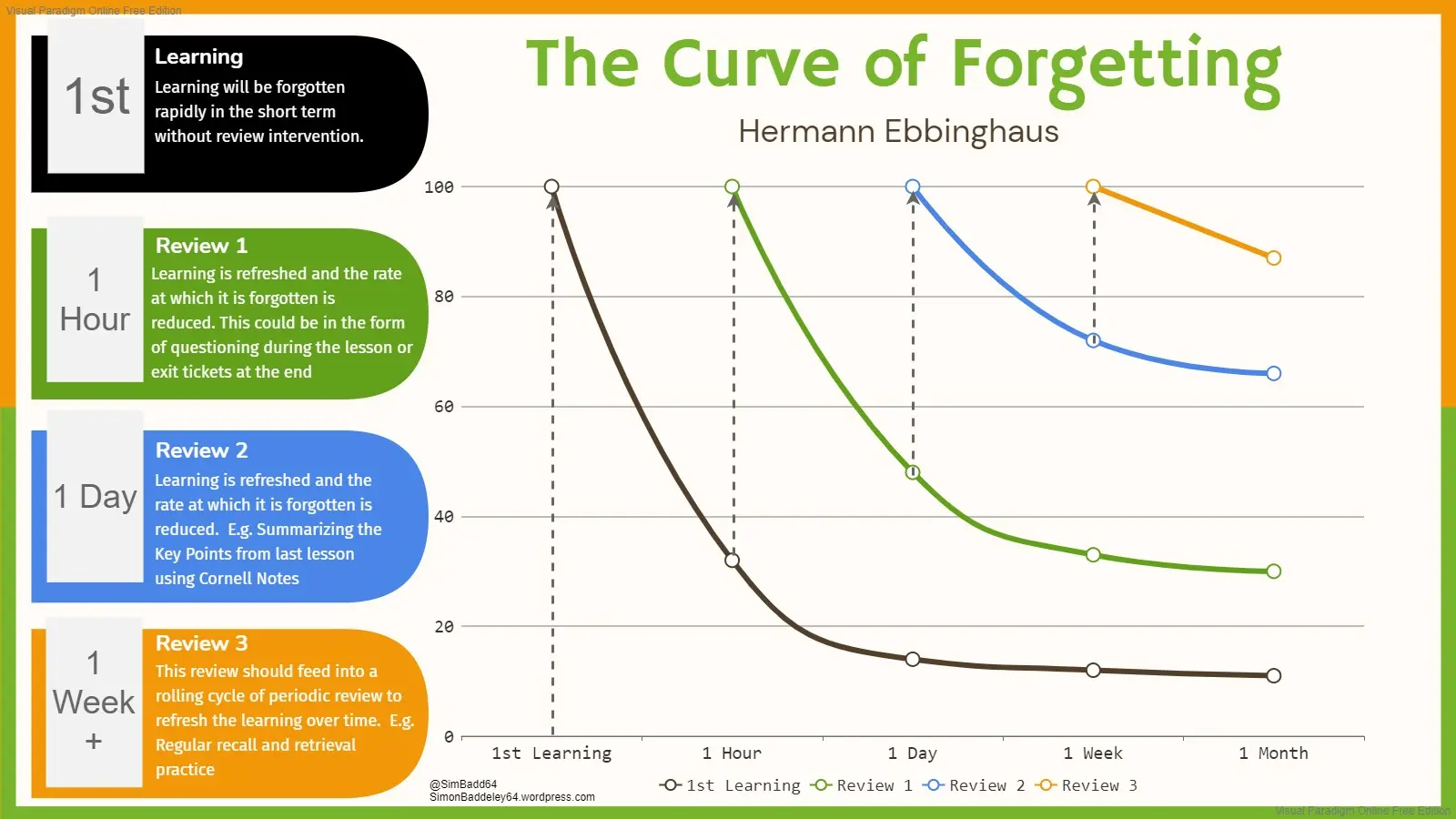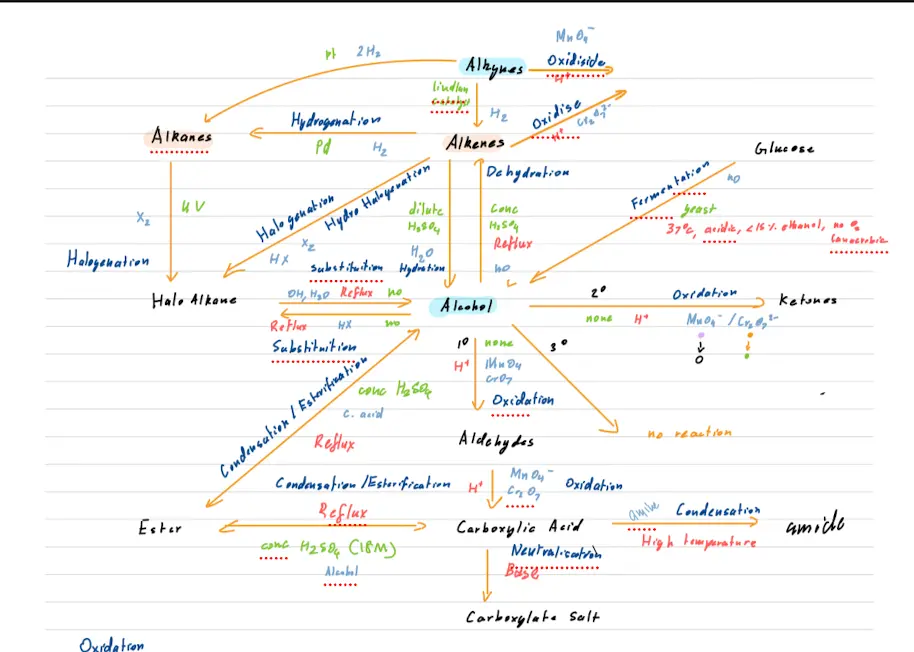Introduction
We have all faced the panic - it’s 10:00 pm the night before the exam and we’re cramming, fueled by Redbull and stress. We all know how to avoid this – just start studying earlier right?
I used to study by highlighting my notes, doing practice questions and re-reading textbooks, which always felt slow and tedious. Although these techniques may have their own benefits, I learnt the hard way that there are significantly more effective (and fun) ways to revise for exams. So how should we make sure we are prepared for the content early? Here is a masterclass on the psychology and methods of revising earlier and more effectively.
Tip 1 - Spaced Repetition
Spaced Repetition is one of the most effective ways to consolidate content. This technique is based on a famous concept in cognitive psychology, Ebbinghaus’ Forgetting Curve, which suggests that after learning, our memory of this knowledge will drastically decline over time unless we make an active effort to retain it.
To overcome this weakness in human memory, you must revisit the content multiple times after learning it, instead of learning it once and forgetting about it. To maximise your chances of being prepared for your exams, here’s what to do:
Step 1
Revisit on the night of learning the content. This is the most important step, as it will help overcome that initial exponential drop in memory.
Step 2
Revisit at least once within the week, and then review fortnightly after that. This will keep everything fresh in your mind.
Step 3
Review frequently until your HSC exams to retain the information effectively. I found monthly revision was enough for me to retain information, but adjust this as per your needs, given everyone is different.
When reviewing, aim to strike a balance between passive revision (e.g. highlighting notes to refresh memory) and active recall (e.g. doing practice questions without notes). Personally, I found it very helpful to use Project Academy’s tutorial system by booking into tutorials and revising content under the supervision of a tutor.

Tip 2 - Active Recall
Active Recall is the process of actively recalling facts and information from your brain. Based on 100 years of research, it is concluded that humans recalling stuff FROM our brains instead of putting things INTO our brains is by far the most efficient and practical as a learning technique. In simple terms, it is the technique of constantly doing practice tests to enforce your knowledge, rather than passive recall, where you just copy down notes and reread information. When combined with Spaced Repetition, it creates a strong study routine.
Below, I have briefly outlined two studies performed 70 years apart that provide solid proof that this method of learning is most advantageous, especially for examination preparation where you have a short amount of time to prepare massive information recall.
Study 1: Spitzer 1939
(https://www.gwern.net/docs/spacedrepetition/1939-spitzer.pdf)
Premise: Two groups of students (Group A and Group B) were each given a set of instructions.
Group A (Control group): Students were told to learn a set of material and were then given a test either a day or a week later. Obviously, the subgroup who did their test a day later performed much better than those who did theirs a week later.
Group B: Students were told to learn a set of material and unlike Group A, were given a practice test at the end of the study session. Their results were interesting. No matter if they sat their actual test a day later or a week later, they performed far better than everyone in Group A!
Conclusion: Just having a revision test after their study session improved their marks by 10 - 15%!
Study 2: Karpicke & Blunt 2011
(https://science.sciencemag.org/content/331/6018/772.full)
Premise: 4 groups of students were told to study in the following ways before sitting a test the following week:
Group A: Study once Group B: Study 4 times Group C: Study and then draw a mind map Group D: Study and then do a self test afterwards
Conclusion: Although Group B (studied 4 times), clearly performed better than both Group A (those who studied once) and Group C (those who made mind maps), the results of Group D (those who took a simple test after their study) performed considerably better than any of the other groups (and achieved this much more efficiently than the group that studied 4 times!)
For the HSC, there are a few very simple steps to active recall:
Step 1
After you take your initial notes, attach questions that specifically target that concept of the topic, and then do these at the critical forgetting points outlined in Tip 1: Spaced Repetition.
I found that looking in Project Academy’s Library app and picking questions out of the extensive collection of past papers was the best way to do this. There are also plenty of resources online or in textbooks where you can source topic-specific questions.
Step 2
Once you have tested yourself for the entire topic for the first time, collate additional question sets for the topic. Starting these additional question sets soon after you first learn the concept, and then frequently testing yourself will set you up for exams beautifully.
Depending on the subject, you might go about Active Recall differently: For my calculation-heavy subjects, I created question banks that I would do in little “sprints” (short, timed runs of questions from the same topic) For my content-heavy subjects, I created flashcards and quizzes that I would go back (I used GoodNotes, Quizlet, and Anki to create them)
Step 3
Well before your exam, start doing full past papers because doing well in exams also requires great exam technique.
For all my past papers, I did them under the strictest test conditions to replicate an actual exam, and I suggest you follow these same conditions:
-
Closed book
-
Timed
-
Marking as harshly as possible
Then when reviewing/rewriting your responses, using the rubric to guide the responses.
Ahead of exams, I attended Project’s 12 week LEAP exam preparation program, which is possibly one of the most successful and well thought out exam programs that fully utilise Active Recall. In previous years, students usually see a 10-15% improvement in their marks ahead of Trials, and you also get super detailed marking feedback which you can review in person in daily available tutorials - especially useful for content-heavy subjects.
Tip 3 - Visualisation and Diagram Drawing
We have all heard that everyone has a unique learning style (visual, auditory, reading and writing, and kinesthetic). But this has long been disproved, and new evidence suggests we learn best when ALL parts of the brain are utilised. This is why visualisation and diagram drawing is one of the most important things to mentally organise the content that you receive during HSC.
Visualisation and diagram drawing help to make sense of the logical connections between topics and even for action plans and revision. The best method of doing this is at the start of a topic. Create a mind map of all the things that need to be covered by reading the syllabus and once covered, expand on each branch by summarising the content. This way you will easily figure out what is missing, and maybe even get a bit of motivation from this gamified approach.

Making flow charts for your subjects, such as reaction pathways in HSC Chemistry, Applied Calculus in Maths, or even HSC Economics essay plans, can help you remember and create the scaffolds needed in exam responses, as well as clearly visualise any cause-and-effect pairs.
Tip 4 - Get Third Party Feedback
Actively receiving feedback is one of the best ways to guide your exam responses in the right direction. For more subjective subjects such as English, remembering facts is just not enough. You need to practice your ability to adapt to essay questions and short answers, as well as your ability to effectively convey ideas (rather than simply recalling facts or formulas). This skill can only be honed through receiving and then reviewing feedback.
Submitting work early to your teacher at school is one of the easiest ways to achieve this. However, reply times may be slow. For any subjects you’re particularly weak in, I suggest getting a tutor or a senior who is willing to mark your responses on demand. It will be an investment but it is far better than waiting a couple of weeks for a teacher to get back to you.
Project Academy has a dedicated team of markers who mark your submissions on demand. This personally helped significantly because I went through many iterations ahead of exams, which helped me shape my responses into a format that could secure me all the marks whilst ensuring the style of the response was still my own.
Tip 5 - Teach Someone
Your ability to teach someone means you are not just able to recall information, but also understand it enough to break it down so someone can understand it.
The very act of teaching another student is an Active Recall exercise since you are actively recalling facts and information FROM your brain, which strengthens those muscle links that improve memory.
This significantly helps you in exams because if you think of an exam as a giant set of questions, it essentially mimics a less-knowledgeable person asking you probing questions for 2 -3 hours. You’re effectively “teaching” the exam writer specific pieces of content you have learnt.
Realising this will help you understand that the ability to teach is one of the best indicators of your exam readiness.
Conclusion
Consolidating knowledge leading up to exams can be daunting with the amount of work you need to do. I hope that the tips given in this article help you with the stress of exam preparation and can guide you during the downtimes in between terms.









